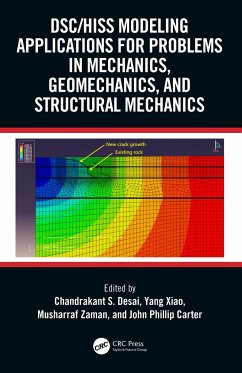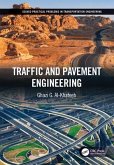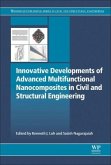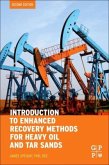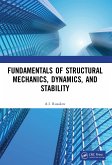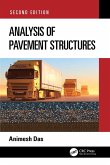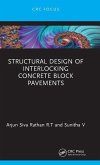DSC/HISS Modeling Applications for Problems in Mechanics, Geomechanics, and Structural Mechanics
Herausgegeben:Desai, Chandrakant S.; Xiao, Yang; Zaman, Musharraf; Carter, John Phillip
DSC/HISS Modeling Applications for Problems in Mechanics, Geomechanics, and Structural Mechanics
Herausgegeben:Desai, Chandrakant S.; Xiao, Yang; Zaman, Musharraf; Carter, John Phillip
- Gebundenes Buch
- Merkliste
- Auf die Merkliste
- Bewerten Bewerten
- Teilen
- Produkt teilen
- Produkterinnerung
- Produkterinnerung
Understanding the mechanical behavior of solids and contacts (interfaces and joints) is vital for the analysis, design, and maintenance of engineering systems. Materials may simultaneously experience the effects of many factors such as elastic, plastic, and creep strains; different loading (stress) paths; volume change under shear stress; and microcracking leading to fracture and failure, strain softening, or degradation. Typically, the available models account for only one factor at a time; however, the disturbed state concept (DSC) with the hierarchical single-surface (HISS) plasticity is a…mehr
Andere Kunden interessierten sich auch für
![Traffic and Pavement Engineering Traffic and Pavement Engineering]() Ghazi G. Al-KhateebTraffic and Pavement Engineering51,99 €
Ghazi G. Al-KhateebTraffic and Pavement Engineering51,99 €![Innovative Developments of Advanced Multifunctional Nanocomposites in Civil and Structural Engineering Innovative Developments of Advanced Multifunctional Nanocomposites in Civil and Structural Engineering]() Innovative Developments of Advanced Multifunctional Nanocomposites in Civil and Structural Engineering152,99 €
Innovative Developments of Advanced Multifunctional Nanocomposites in Civil and Structural Engineering152,99 €![Introduction to Enhanced Recovery Methods for Heavy Oil and Tar Sands Introduction to Enhanced Recovery Methods for Heavy Oil and Tar Sands]() James G. SpeightIntroduction to Enhanced Recovery Methods for Heavy Oil and Tar Sands92,99 €
James G. SpeightIntroduction to Enhanced Recovery Methods for Heavy Oil and Tar Sands92,99 €![Fundamentals of Structural Mechanics, Dynamics, and Stability Fundamentals of Structural Mechanics, Dynamics, and Stability]() A.I. RusakovFundamentals of Structural Mechanics, Dynamics, and Stability68,99 €
A.I. RusakovFundamentals of Structural Mechanics, Dynamics, and Stability68,99 €![Computer-Aided Highway Engineering Computer-Aided Highway Engineering]() Sandipan GoswamiComputer-Aided Highway Engineering58,99 €
Sandipan GoswamiComputer-Aided Highway Engineering58,99 €![Analysis of Pavement Structures Analysis of Pavement Structures]() Animesh Das (Department of Civil Engineering, IIT Kanpur, India.)Analysis of Pavement Structures66,99 €
Animesh Das (Department of Civil Engineering, IIT Kanpur, India.)Analysis of Pavement Structures66,99 €![Structural Design of Interlocking Concrete Block Pavements Structural Design of Interlocking Concrete Block Pavements]() Arjun Siva Rathan R.TStructural Design of Interlocking Concrete Block Pavements52,99 €
Arjun Siva Rathan R.TStructural Design of Interlocking Concrete Block Pavements52,99 €-
-
-
Understanding the mechanical behavior of solids and contacts (interfaces and joints) is vital for the analysis, design, and maintenance of engineering systems. Materials may simultaneously experience the effects of many factors such as elastic, plastic, and creep strains; different loading (stress) paths; volume change under shear stress; and microcracking leading to fracture and failure, strain softening, or degradation. Typically, the available models account for only one factor at a time; however, the disturbed state concept (DSC) with the hierarchical single-surface (HISS) plasticity is a unified modeling approach that can allow for numerous factors simultaneously, and in an integrated manner. DSC/HISS Modeling Applications for Problems in Mechanics, Geomechanics, and Structural Mechanics provides readers with comprehensive information including the basic concepts and applications for the DSC/HISS modeling regarding a wide range of engineering materials and contacts. Uniformity in format and content of each chapter will make it easier for the reader to appreciate the potential of using the DSC/HISS modeling across various applications.
Features:
- Presents a new and simplified way to learn characterizations and behaviors of materials and contacts under various conditions
- Offers modeling applicable to several different materials including geologic (clays, sands, rocks), modified geologic materials (structured soils, overconsolidated soils, expansive soils, loess, frozen soils, chemically treated soils), hydrate-bearing sediments, and more.
Features:
- Presents a new and simplified way to learn characterizations and behaviors of materials and contacts under various conditions
- Offers modeling applicable to several different materials including geologic (clays, sands, rocks), modified geologic materials (structured soils, overconsolidated soils, expansive soils, loess, frozen soils, chemically treated soils), hydrate-bearing sediments, and more.
Produktdetails
- Produktdetails
- Verlag: CRC Press / Taylor & Francis
- Seitenzahl: 460
- Erscheinungstermin: 30. November 2023
- Englisch
- Abmessung: 260mm x 183mm x 29mm
- Gewicht: 453g
- ISBN-13: 9781032422848
- ISBN-10: 103242284X
- Artikelnr.: 68475002
- Herstellerkennzeichnung
- Libri GmbH
- Europaallee 1
- 36244 Bad Hersfeld
- gpsr@libri.de
- Verlag: CRC Press / Taylor & Francis
- Seitenzahl: 460
- Erscheinungstermin: 30. November 2023
- Englisch
- Abmessung: 260mm x 183mm x 29mm
- Gewicht: 453g
- ISBN-13: 9781032422848
- ISBN-10: 103242284X
- Artikelnr.: 68475002
- Herstellerkennzeichnung
- Libri GmbH
- Europaallee 1
- 36244 Bad Hersfeld
- gpsr@libri.de
Chandrakant S. Desai is a Regents' Professor (Emeritus), Department of Civil and Architectural Engineering and Mechanics, University of Arizona, Tucson, Arizona. He has made original and significant contributions in basic and applied research in material-constitutive modeling, laboratory testing, and computational methods for a wide range of problems in engineering mechanics, civil engineering (Geomechanics, structural dynamics, earthquake engineering), flow through porous media, and mechanical engineering (electronic packaging). One of the main topics of Dr. Desai's research involves development of the new and innovative disturbed state concept (DSC) for constitutive modeling of materials and interfaces/joints, e.g., soils, rocks, glacial tills, concrete, asphalt, metals, alloys, silicon with impurities, polymers, and lunar. DSC connects mechanics, physics (thermodynamics) and philosophy. In conjunction with nonlinear computer (finite element) methods, it provides a new and alternative procedure for analysis, design, and reliability for challenging and complex problems of modern technology. The DSC is a major and significant contribution that has been adopted for research, teaching, and application in several engineering disciplines. He has authored/edited about 25 books, 20 book chapters, and has been author/coauthor of over 350 technical papers in refereed journals and conferences. He is the founding Editor-in-Chief of the International Journal of Geomechanics, ASCE. He has received several awards and recognitions, e.g. The Distinguished Member Award by the American Society of Civil Engineers (ASCE); The Nathan M. Newmark Medal, by Engineering Mechanics and Structural Engineering Institutes, ASCE; The Karl Terzaghi Award, by Geo Institute, (ASCE). Professor Yang Xiao is Full Professor of the School of Civil Engineering, Chongqing University. He received his Ph.D. degree on College of Civil and Transportation Engineering, Hohai University, Nanjing, China. He is a recognized researcher in the area of rockfill dam, railway geotechnics, biotreatment geotechnics, recycled waste and granular flow mechanics. His research focuses on the testing and theoretical modelling of clay, silt, sand, rockfill, ballast, and biocemented soils. He has an H-Index of 29 in Scopus. He has 2570+ citations and 100+ publications. He got many awards, such as 2018 and 2019 Most Cited Chinese Researchers from Elsevier, 2020 World's Top 2% Scientists (Singleyr), John Carter Award in IACMAG, Excellent Doctoral Dissertation of Chinese Society for Rock and Mechanics and Engineering, et al. He is also Associate Editor of International Journal of Geomechanics, ASCE, and Editor Board Member of Acta Geotechnica; Canadian Geotechnical Journal; Soils and Foundations. Musharraf Zaman holds the Aaron Alexander Professorship in Civil Engineering and Alumni Chair Professorship in Petroleum Engineering at the University of Oklahoma (OU) in Norman. He received his Ph.D. in Civil Engineering from the University of Arizona, Tucson. He has been serving as the Director of the Southern Plains Transportation Center (SPTC) - a consortium of eight universities in U.S. DOT Region 6 - for more than seven years. He served as the Associate Dean for Research and Graduate Programs in OU Gallogly College of Engineering for more than eight years. His research interests are in geomechanics, constitutive modeling, soil-structure interaction, laboratory and field testing, pavement materials and systems, and intelligent compaction. At OU, he has received more than $30 Million in external funding, developed two new asphalt laboratories, and supervised more than 80 theses and dissertations to completion. He has published more than 200 journal and 275 peer reviewed conference proceedings papers, and 12 books and book chapters. Several of his papers have won prestigious awards from international societies and organizations. In 2011, he won the prestigious Outstanding Contribution Award, given by IACMAG, for life-long contributions in geomechanics. John Carter is an Emeritus Professor at the University of Newcastle. He is a former Pro Vice-Chancellor and Dean of Engineering at the University of Newcastle, NSW, and a former Consultant Director of Advanced Geomechanics Pty Ltd (now Fugro AG Pty Ltd). He is a graduate of the Australian Institute of Company Directors and a former Director of the Newcastle Port Corporation. He is currently the President, International Association for Computer Methods and Advances in Geomechanics. John is a geotechnical engineer with more than 40 years of experience in teaching, research and consulting in civil and geotechnical engineering. He is the author of more than 400 technical articles in peer-reviewed journals and international conferences. He has experience as an expert witness in legal cases in Queensland, New South Wales and Victoria, and he has also been an advisor and consultant to industry and government. In December 2019 he was appointed by the Governor of Queensland as a Commissioner of the Paradise Dam Inquiry, which concluded with a report presented to the Queensland government at the end of April 2020. He is a Fellow of the Australian Academy of Science, the Australian Academy of Technology and Engineering, the Royal Society of NSW, the EU Academy of Sciences, Engineers Australia and the Australian Institute of Building. In January 2006 he was appointed as a Member of the Order of Australia (AM) for his contributions to civil engineering through research into soil and rock mechanics and as an adviser to industry.
Section 1. Introduction. 1. Disturbed State Concept (DSC) with Hierarchical Single Surface (HISS) Plasticity: Theory and Application. Section 2. Geologic Materials. 2. Liquefaction in Geologic Materials. 3. Disturbed State Concept-Based Compression Model for Structured Clays. 4. Sands and Structural Clays. 5. A New Creep Constitutive Model for Soft Rocks and its Application in Prediction of Time-dependent Deformation Disaster in Tunnels. 6. Hydro-Mechanical Behavior of Unsaturated Collapsible Loessial Soils. 7. Applications of DSC in Modeling Strain-Softening Stress-Strain Relationship of Unsaturated Soils. 8. Coefficient of Lateral Soil Pressure in Unsaturated Soils. Section 3. Structured and Bio- or Chem-Treated Soils. 9. Compression of Structured Geomaterials. 10. Chemically Treated Soils. 11. Binary-Medium Constitutive Model (BMCM) for Structured Soils. 12. Collapsing of Sandstone: Acoustic Emission Study Based on DSC Model. Section 4. Fracturing and Crushing Grains. 13. Particle Crushing: DSC/HISS Model Considering the Particle Crushing of Soil. 14. Prediction of Strength for the Degradation of Single-Particle Crushing Based on DSC. Section 5. Geotechnical Structures and Engineering. 15. Reinforced Earth Geosynthetic Walls. 16. Theoretical Solution for Long-term Settlement of a Large Step-Tapered Hollow Pile in Karst Topography. 17. Fluid Flow: Seepage, and Consolidation. 18. A New Theoretical Settlement Model for Large Step-Tapered Hollow Piles Based on the Disturbed State Concept Theory. 19. Applications of DSC and HISS Soil Models in Nonlinear Finite Element Dynamic Analyses of Soil-Structure Interaction Problems. Section 6. Concrete, Pavement Materials, and Structural Engineering. 20. Unified DSC/HISS Constitutive Model for Pavement Materials. 21. Application of DSC/HISS Models for Behavior and Prediction of Rutting in Asphalt Pavements. 22. Concrete. Section 7. Interfaces and Joints. 23. Interfaces and Joints. 24. Interfaces and Joints: Laboratory Tests and Applications. 25. Unsaturated Soil Interfaces.
Section 1. Introduction. 1. Disturbed State Concept (DSC) with Hierarchical Single Surface (HISS) Plasticity: Theory and Application. Section 2. Geologic Materials. 2. Liquefaction in Geologic Materials. 3. Disturbed State Concept-Based Compression Model for Structured Clays. 4. Sands and Structural Clays. 5. A New Creep Constitutive Model for Soft Rocks and its Application in Prediction of Time-dependent Deformation Disaster in Tunnels. 6. Hydro-Mechanical Behavior of Unsaturated Collapsible Loessial Soils. 7. Applications of DSC in Modeling Strain-Softening Stress-Strain Relationship of Unsaturated Soils. 8. Coefficient of Lateral Soil Pressure in Unsaturated Soils. Section 3. Structured and Bio- or Chem-Treated Soils. 9. Compression of Structured Geomaterials. 10. Chemically Treated Soils. 11. Binary-Medium Constitutive Model (BMCM) for Structured Soils. 12. Collapsing of Sandstone: Acoustic Emission Study Based on DSC Model. Section 4. Fracturing and Crushing Grains. 13. Particle Crushing: DSC/HISS Model Considering the Particle Crushing of Soil. 14. Prediction of Strength for the Degradation of Single-Particle Crushing Based on DSC. Section 5. Geotechnical Structures and Engineering. 15. Reinforced Earth Geosynthetic Walls. 16. Theoretical Solution for Long-term Settlement of a Large Step-Tapered Hollow Pile in Karst Topography. 17. Fluid Flow: Seepage, and Consolidation. 18. A New Theoretical Settlement Model for Large Step-Tapered Hollow Piles Based on the Disturbed State Concept Theory. 19. Applications of DSC and HISS Soil Models in Nonlinear Finite Element Dynamic Analyses of Soil-Structure Interaction Problems. Section 6. Concrete, Pavement Materials, and Structural Engineering. 20. Unified DSC/HISS Constitutive Model for Pavement Materials. 21. Application of DSC/HISS Models for Behavior and Prediction of Rutting in Asphalt Pavements. 22. Concrete. Section 7. Interfaces and Joints. 23. Interfaces and Joints. 24. Interfaces and Joints: Laboratory Tests and Applications. 25. Unsaturated Soil Interfaces.

